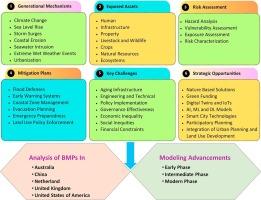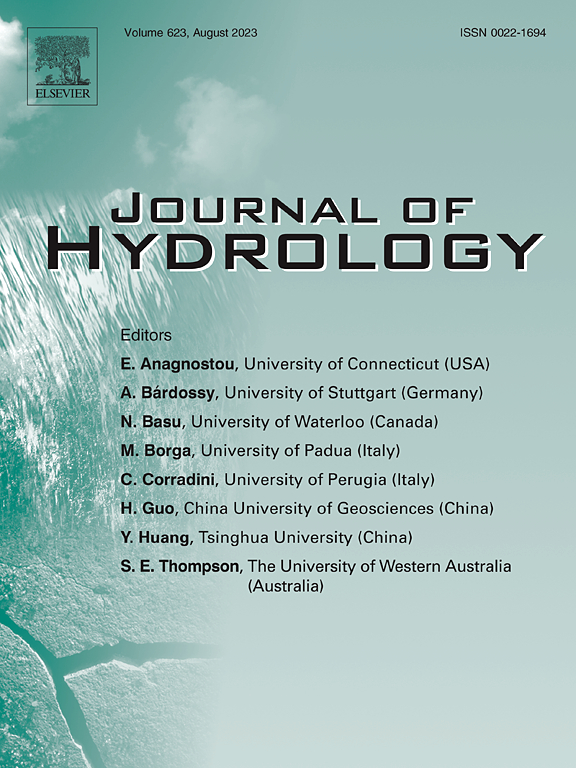沿海城市洪水风险管理:挑战与机遇--系统回顾
IF 6.3
1区 地球科学
Q1 ENGINEERING, CIVIL
引用次数: 0
摘要
沿海城市洪水风险的代际机制和时空演变模式涉及气候变化、海平面上升和人为因素之间复杂的相互作用,需要采取综合的适应性洪水管理策略,以缓解不断变化的脆弱性。本系统性综述全面评估了沿海城市地区洪水风险管理中可持续适应的挑战和战略机遇。它整合了新兴的创新技术和金融解决方案,以确定实施减缓战略和提高沿海城市抗洪能力的可行方法。加强治理和政策框架对于成功实施沿海城市洪水风险管理(CUFRM)计划至关重要。制定了一个创新的参与式规划框架,以促进具有社会包容性和公平性的洪水管理做法。为绿色基础设施和基于自然的解决方案提供资金,以及战略性地利用公私合作伙伴关系,是推进可持续洪水风险管理(FRM)的有效方法。新兴技术的进步,如人工智能(AI)、机器学习(ML)、深度学习(DL)、社交媒体和数字孪生技术,为模拟洪水情景提供了动态的协作平台,并有可能显著改善中央防洪委员会的做法。最后,通过对澳大利亚、中国、荷兰、英国和美国的现行做法进行跨国比较,我们发现了多种多样的方法以及从地区经验中获得的宝贵见解。这篇综述为研究人员、决策者和从业人员提供了全面的分析,旨在通过借鉴有效的超大洪水管理方法,加强治理结构、基础设施抗灾能力和筹资机制,从而提高沿海大都市地区的抗洪能力。本文章由计算机程序翻译,如有差异,请以英文原文为准。

Coastal urban flood risk management: Challenges and opportunities − A systematic review
Generational mechanisms and spatio-temporal evolution patterns of coastal urban flood risk involve complex interactions between climate change, sea level rise and human-induced factors, necessitating integrated adaptive flood management strategies to mitigate evolving vulnerabilities. This systematic review offers a thorough assessment of the challenges and strategic opportunities for sustainable adaptation in managing flood risk in coastal urban areas. It integrates emerging innovative technologies and financial solutions to identify promising approaches to implement mitigation strategies and improve coastal urban flood resilience. Enhancing governance and policy frameworks is crucial for the successful implementation of coastal urban flood risk management (CUFRM) plans. An innovative participatory planning framework is developed to promote flood management practices which are socially inclusive and equitable. Funding for green infrastructure and nature-based solutions and the strategic use of public-private partnerships are effective methods for advancing sustainable flood risk management (FRM). The advancements in emerging technologies, such as artificial intelligence (AI), machine learning (ML), deep learning (DL), social media and digital twin technologies, provide dynamic and collaborative platforms for simulating flood scenarios and have potential to significantly improve CUFRM practices. In the end, a cross-country comparison of current practices in Australia, China, the Netherlands, the UK and the USA reveals a diverse range of approaches and valuable insights derived from regional experiences. The review provides a comprehensive analysis for researchers, policymakers and practitioners aiming to improve flood resilience in coastal metropolitan regions by learning from effective UFRM approaches that enhance governance structures, infrastructure resilience and funding mechanisms.
求助全文
通过发布文献求助,成功后即可免费获取论文全文。
去求助
来源期刊

Journal of Hydrology
地学-地球科学综合
CiteScore
11.00
自引率
12.50%
发文量
1309
审稿时长
7.5 months
期刊介绍:
The Journal of Hydrology publishes original research papers and comprehensive reviews in all the subfields of the hydrological sciences including water based management and policy issues that impact on economics and society. These comprise, but are not limited to the physical, chemical, biogeochemical, stochastic and systems aspects of surface and groundwater hydrology, hydrometeorology and hydrogeology. Relevant topics incorporating the insights and methodologies of disciplines such as climatology, water resource systems, hydraulics, agrohydrology, geomorphology, soil science, instrumentation and remote sensing, civil and environmental engineering are included. Social science perspectives on hydrological problems such as resource and ecological economics, environmental sociology, psychology and behavioural science, management and policy analysis are also invited. Multi-and interdisciplinary analyses of hydrological problems are within scope. The science published in the Journal of Hydrology is relevant to catchment scales rather than exclusively to a local scale or site.
 求助内容:
求助内容: 应助结果提醒方式:
应助结果提醒方式:


